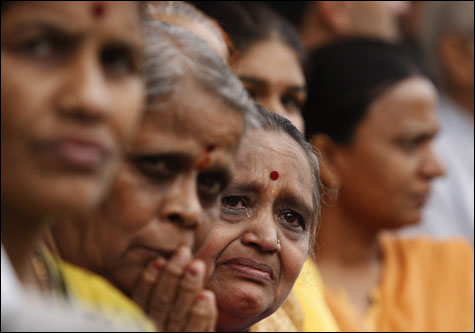
MOURNERS: Mumbai — the world’s most populous city proper — surges ever forward on tension and the pursuit of dreams, and has come under fire before. But this time is different, say local newscasters of the recent coordinated offenses that killed nearly 200. |
"Mumbai meri jaan" is a phrase that has been carried in the hearts of dreamers in this city, on tongues parched by lack of clean water, and on record players that scratch since 1956. It references lyrics to an old Hindi song:
Oh my heart, it's so difficult to live here . . .
but I stay because this is Bombay, my life, my love . . .
and it gives me everything. Oh my heart.
I first heard it from the lips of an old Indian woman, a vegetable seller, speaking in rapid Hindi to a fruit vendor next to her on the pavement. They sleep on the street under the tarp that displays their wares. Mumbai meri jaan. Bombay, my life, my love.
Mumbai is a city where some 10 million exiles gathered to chase their dreams, a city of cruel labor, and a city of suffering piled upon suffering. It is a city of many names — the city of gold, the city of dreams. It is the place where Bollywood stars are born, where India's modernity is marked, where everyone is seeking their personal grail. It is a place that takes everything — your labor, your strength, your sanity — but promises so much. What could be greater than the promise of a fulfilled dream?
At 9:30 pm on Wednesday, November 26, those dreams, manifested by the splendid Taj Mahal hotel, were attacked. The Taj was built by Indian industrialist Jamsetji N. Tata, who believed Mumbai needed a hotel as majestic as those in other great cities of the world — a place where exiles who'd caught their dreams could stay. It is as iconic for Mumbai as the World Trade Center was for New York, and it too nearly fell.
Mumbai has been battered by terror time and again. A friend told me, "Bombay is a punching bag, saying 'Punch me, it's okay, I won't do anything.' " My friend was born here in 1977. In 1993, he watched 13 bomb explosions shake the city, causing widespread rioting. He still has bloodstains in the back seat of his car from 2006, when he transported five dying people to the hospital after seven bomb blasts in 11 minutes took the lives of 209 passengers on the local train.
The day after those train blasts, everyone returned to work. Commerce resumed. Schools resumed. Even entertainment venues reopened. Mumbai is a place where people live and eat on daily wages, where everyone knows that in order to catch that elusive dream one must never stop moving.
And they never do. The street sweeper, in the desperate hope that one day he might drive a rickshaw, and the rickshaw driver, that one day he might open a shop — the sweeper never stops sweeping and the driver keeps driving.
Thirteen million people crowd into streets and corners and gutters, and thousands move in everyday. Space is fictional; the city lives on tension, and pursuit, and motion.
"Maybe it is out of necessity. Maybe it is what we know," explains my friend Neha, who went to sleep on Wednesday to the sound of bullets five yards from her window, "but the city always keeps moving."
Even when terror strikes, she says, there is the hope that, if we keep moving, these events will cease to be a nightmare, but instead become part of the fabric of this life. I keep moving to try to speed up time past last week. And because I, too, cannot afford to pause the chasing of a dream.
This time, though, it is not the same for Mumbai. "This is different," the TV announcers said through bleary eyes on the third sleepless night of violence. "This is war."
Unlike previous terror attacks — small by comparison, unorganized, and often the result of regional or religious tensions brought to boiling point — these 48 hours of violence were far removed from any familiar pattern.
An attack so indiscriminate — killing both the wealthiest man at the Taj and the poorest street sweeper at Victoria Terminus train station, killing both Bombayite dream-chasers and visitors from the West who have come to marvel at this new, modern India — an attack so calculated and so audacious, this cannot be ignored.
You can feel the change on the streets. Shopkeepers opened their shops only to close them again a few hours later — that day's earnings, gone. Many of the rickshaws that usually crowd the street are still missing. In the three months I have been in Mumbai prior to the attacks, I never heard the water of the Arabian Sea crash against the shore. Now it roars over the stillness. Daily life has resumed, but with a numbness, and in slow motion.